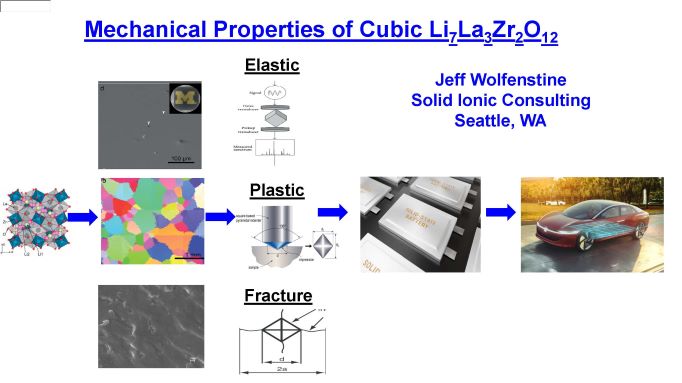Electrochem Seminar - "Mechanical Properties of Cubic Li7La3Zr2O12" - Dr. Jeff Wolfenstine, Solid Ionic Consulting
Electrochem Seminar - "Mechanical Properties of Cubic Li7La3Zr2O12" - Dr. Jeff Wolfenstine, Solid Ionic Consulting
Abstract
Recently there has been a strong interest in the development of solid Li-ion electrolytes for use in batteries that have higher energy and increased safety compared to the current Li-ion batteries. One such battery is an all-state-state battery with a Li anode. The major requirements for the solid Li-ion electrolyte are: high Li-ion conductivity, low electronic conductivity, and chemical/electrochemical stability with the Li metal anode/cathode. One such solid electrolyte that meets many of these requirements is cubic Li-garnet of nominal composition Li7La3Zr2O12 (LLZO). However, there is another important requirement. LLZO must also exhibit adequate and reliable mechanical properties. Mechanical properties of the LLZO solid electrolyte are important for the manufacture, assembly and operation of the cell/battery. For the case of operation, it is known that as the fracture strength of the electrolyte is increased this allows for a thinner electrolyte leading to lower cell resistance, higher power output during discharging and also higher energy density. There is recent work which suggests that the critical current (current at which dendrites form during charging, leading to cell failure) for a solid electrolyte with a solid metal anode is related to the fracture strength/fracture toughness of the solid electrolyte, increasing with increasing fracture strength/fracture toughness. Thus, it is imperative to determine and understand the mechanical properties of LLZO and to relate them to the structure/microstructure. It is the purpose of this talk to present the mechanical properties of LLZO as function of structure/microstructure and their relevance to cell operation. The mechanical properties that will be covered include the room temperature elastic (e.g., modulus), plastic (e.g., hardness) and fracture (fracture strength/fracture toughness) and high-temperature creep.
Speaker
Jeff WolfenstineAn internationally recognized scientist (H index 55) in materials science, with emphasis on processing, characterization, and properties of energy-storage and structural materials. Has published >170 refereed journal papers, research referenced in textbooks, many of these papers are cited in review articles. Outstanding paper of the year in the Journal of Thermal Spray Technology. Received two Army R&D awards, best paper at an Army science conference, eight U.S. patents, and one international patent and eight patent applications. On the editorial board of Ionics and Journal of Power Sources. Has received federal, state, and industrial funding for his research. Directly supervised Ph.D. and M.S. students. Currently working with the University of Michigan and Ulsan Institute of Science and Technology (Korea) on Na batteries.
Research Interests: My research has primarily focused on studies of imperfections in crystals, solid-state reaction kinetics, mechanical behavior of solids, processing, solid-state chemistry and electrochemistry. Primary attention has recently been on understanding of processing and properties of solid electrolytes, mixed ionic-electronic conducting materials and alloy anodes for use in Li-ion/Li (Na) batteries. Previous attention was on the processing and elevated-temperature mechanical properties of structural materials for aerospace and energy applications.
